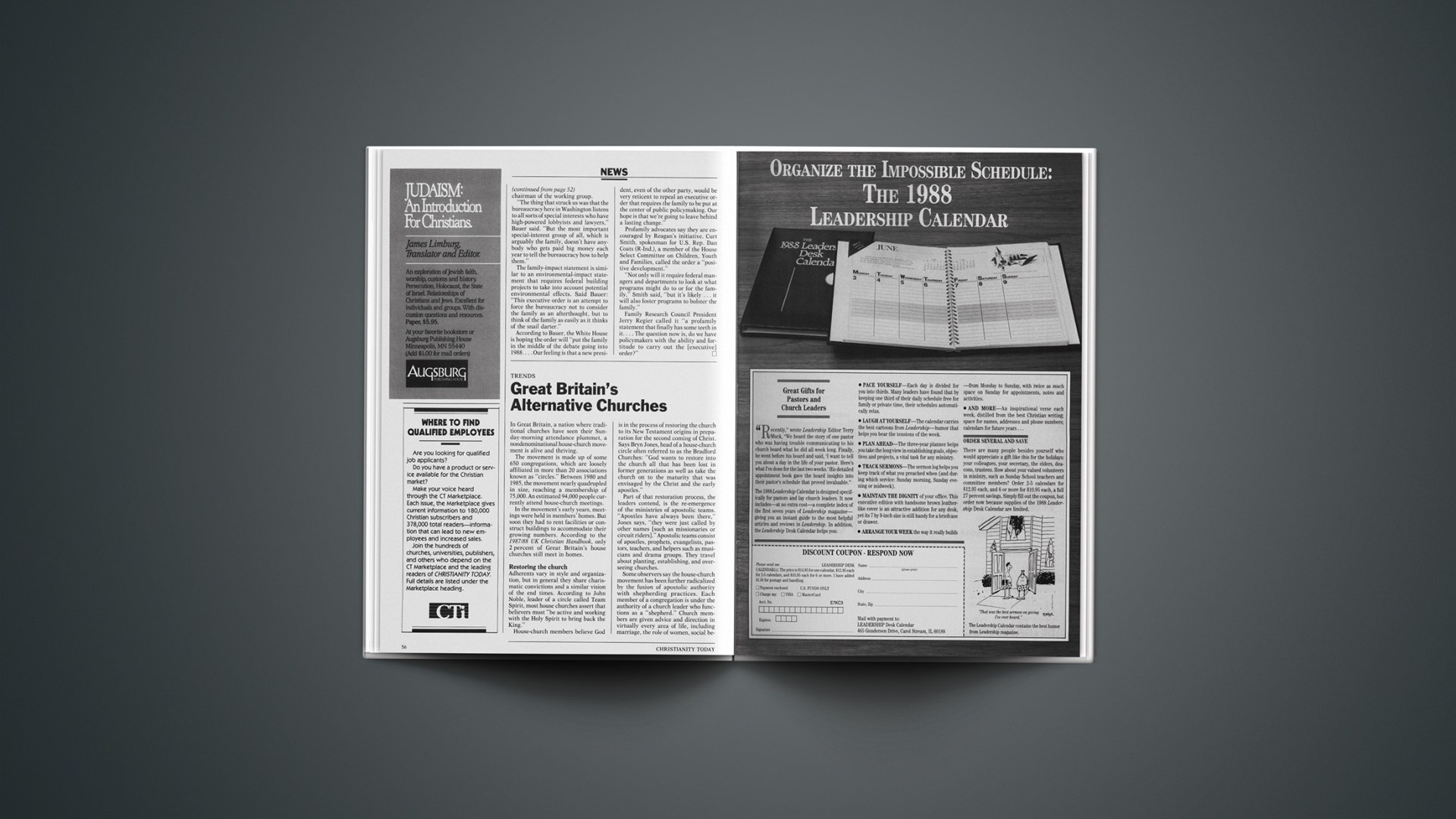In Great Britain, a nation where traditional churches have seen their Sunday-morning attendance plummet, a nondenominational house-church movement is alive and thriving.
The movement is made up of some 650 congregations, which are loosely affiliated in more than 20 associations known as “circles.” Between 1980 and 1985, the movement nearly quadrupled in size, reaching a membership of 75,000. An estimated 94,000 people currently attend house-church meetings.
In the movement’s early years, meetings were held in members’ homes. But soon they had to rent facilities or construct buildings to accommodate their growing numbers. According to the 1987/88 UK Christian Handbook, only 2 percent of Great Britain’s house churches still meet in homes.
Restoring The Church
Adherents vary in style and organization, but in general they share charismatic convictions and a similar vision of the end times. According to John Noble, leader of a circle called Team Spirit, most house churches assert that believers must “be active and working with the Holy Spirit to bring back the King.”
House-church members believe God is in the process of restoring the church to its New Testament origins in preparation for the second coming of Christ. Says Bryn Jones, head of a house-church circle often referred to as the Bradford Churches: “God wants to restore into the church all that has been lost in former generations as well as take the church on to the maturity that was envisaged by the Christ and the early apostles.”
Part of that restoration process, the leaders contend, is the re-emergence of the ministries of apostolic teams. “Apostles have always been there,” Jones says, “they were just called by other names [such as missionaries or circuit riders].” Apostolic teams consist of apostles, prophets, evangelists, pastors, teachers, and helpers such as musicians and drama groups. They travel about planting, establishing, and overseeing churches.
Some observers say the house-church movement has been further radicalized by the fusion of apostolic authority with shepherding practices. Each member of a congregation is under the authority of a church leader who functions as a “shepherd.” Church members are given advice and direction in virtually every area of life, including marriage, the role of women, social behavior, and, in some cases, where to live. Critics have said the practice is too authoritarian.
Despite a common theology, by 1976 the house-church movement was divided into two camps: those who were more structured and emphasized holiness, and those who emphasized freedom and innovation.
Denominational Impact
Church-growth statistician Patrick Johnstone, deputy international secretary of WEC International (formerly World Evangelization Crusade), says the house-church movement must be viewed as part of “a wider picture of a return to a more evangelical position” taking place in Great Britain. This shift, he says, will eventually alter the country’s decline in church membership.
In the late 1950s and early 1960s, many of the house-church leaders came out of Plymouth Brethren assemblies. Others joined from Pentecostal denominations, the Salvation Army, Evangelical Free Baptist churches, and various nonaligned churches. By the late 1970s, charismatics from traditional denominations like the Baptist Union, Methodist Church, and Church of England began to join.
According to Baptist Union General Secretary Bernard Green, when spiritual renewal occurs within a denominational church, those looking for renewal stay. But when church life is “staid and traditional, unchanging, and spiritual renewal is resisted,” he said, people go elsewhere.
The exodus from established Protestant churches “caused a certain amount of polarization” between house-church circles and the denominations, Noble admits, “but this is in the process of being dealt with.”
The most common complaint pertains to the movement’s shepherding practices. Says the Baptist Union’s Green: “The head of the church is Christ. Authority rests with the whole body discerning together and not just an elite spiritual few discerning for the body what is the mind of Christ for his church.”
Donald English, general secretary of the Methodist Church’s Home Mission Division, says many people join house churches because they feel the denominations lack sufficient authority. But in their search, he says, they have chosen a “rather authoritarian model.”
Criticism has also been leveled at house-church circles that foresee the demise of traditional denominations. Jones, for example, says the end-time church must be visibly united in fulfillment of Jesus’ prayer recorded in John 17. The denominations, he feels, “should not have come about, and do not represent the present will of God.”
Jones’s view is not universal, however. The Pioneer Groups and Team Spirit churches fellowship with denominational churches. And Manna Ministries, led by Douglas McBain, an ordained Baptist minister and member of the council of the Baptist Union, is interdenominational in scope.
Some segments of the house-church movement have strengthened their evangelistic outreach. In 1983, for example, Jones’s circle launched campaigns in Britain’s major cities. He says between June 1986 and June 1987, congregations associated with his apostolic team grew by an average of 38 percent, with more than 80 percent of the growth coming through conversions.
At the same time, Noble, of Team Spirit, cites a rising tide of missions interest among house-church circles. And Roger Forster, of Ichthus Fellowship, agrees that a change is taking place in Great Britain’s spiritual climate. But he adds: “We cannot possibly be content. [We must be] much more repentant [and] cry to God that we would get answers” in the quest to evangelize Britain.
By Gail Bennett, in Great Britain.










